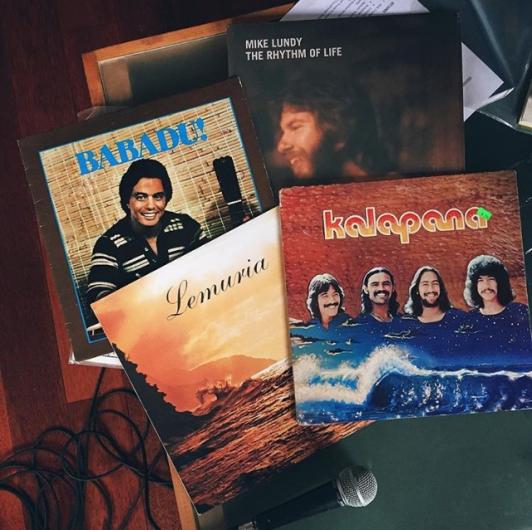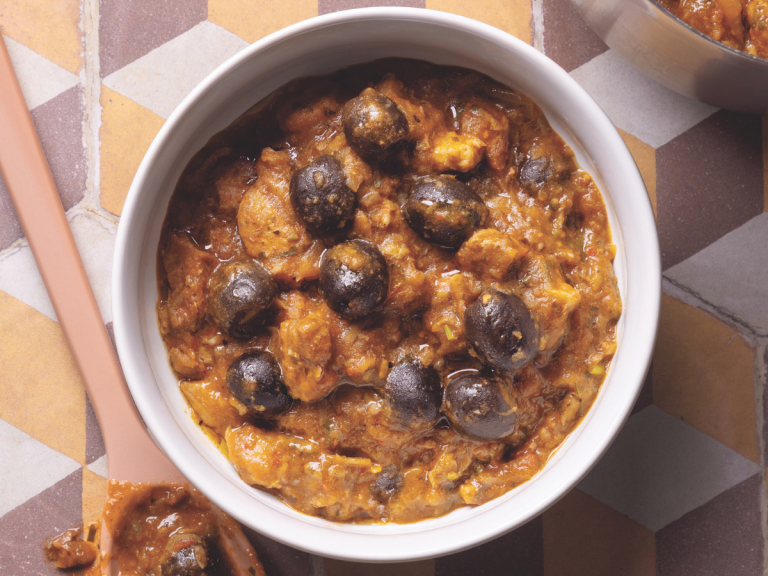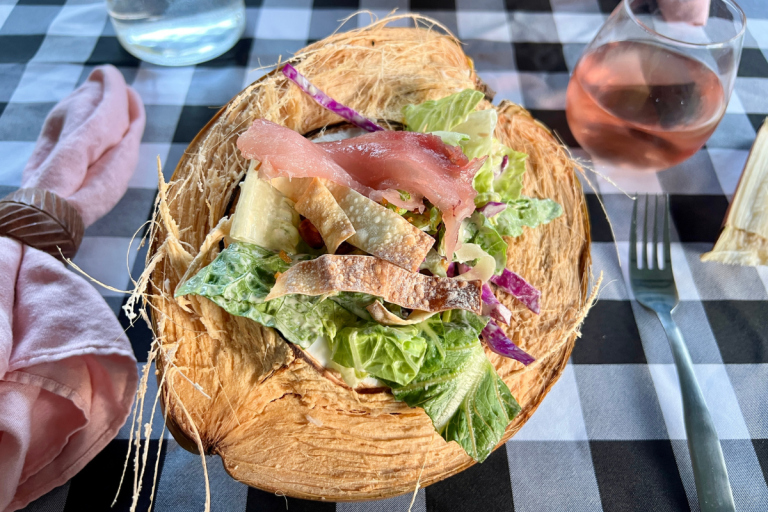Indie Honolulu record label Aloha Got Soul’s founder Roger Bong has been dropping the needle on rare and out-of-print local music for over six years now, unearthing sounds from Hawaii’s grooviest era: the 1970s and ’80s.
Since documenting, digitizing and dispersing relatively unknown made-in-Hawaii recordings on his blog, it’s blossomed into a definitive contemporary guide to music from the times, along with some awesome deep cuts of the decades’ better-known artists like Kalapana, Al Nobriga and Nohelani. He recently released a new compilation, Aloha Got Soul: Soul, AOR & Disco in Hawai‘i 1979-1985, available for purchase on vinyl, CD and download on iTunes. Bong annotated the record with rarely seen photos and original artwork.
“What I’m covering you could probably call the underground scene at that time—jazz, funk and those influences. That’s one way to describe it,” Bong tells HAWAI’I Magazine.
In each track you can also hear a genuine musicality, a showcase of these local artists’ technical prowess, many of whom played (and still do) at the hotels lining Waikiki Beach.
“There was a huge, live entertainment component to everyday life in Hawaii back then,” Bong says. “You could make a living off of live music, but you had to be on your game. For them to get those kinds of gigs, they had to be very skilled and talented. In some ways they were more learned and studied. Not to say people today aren’t. It’s just a different soundscape now—beat machines, samplers, more of it can be automated, preprogrammed in a sense. Musicians back then had to rely on each other to pull something off. They’re all on the same frequency. I think you hear that on the records.”
Here, Bong shares a round-up of what he considers to be the exemplary sounds and artists of that time period. It’s by no means a concrete list, and part of the fun of Aloha Got Soul is the learning curve and endless discovery Bong leads you on of these local music B-sides. And, if you’re a record collector, like Bong, Hungry Ear Records and Idea’s Music and Books in Honolulu have some of the best crates in town for you to dig through.
1. Mackey Feary Band by Macky Feary Band (Rainbow Records, 1978)
Mackey Feary Band – Macky Feary Band – Rainbow Records – 1978 Mackey Feary is the cornerstone to contemporary Hawaiian music. Starting with the group Kalapana and later debuting his own band, Mackey invented a new sound of the islands, mixing soul, AOR, jazz, and rock to create music that fit perfectly with Hawaii’s breezy, laid-back lifestyle. Songs like “The Hurt” represent the local pop music sound of the seventies. Hawaii radio stations still spin “The Hurt” on regular rotation. But Mackey’s discography runs much deeper. Start with his band’s debut album, Macky Feary Band, and you’ll discover quality rare grooves like “A Million Stars” and “You’re Young”. In my opinion, this is the quintessential Hawaiian black music album because it represents a musician who is pushing the Hawaiian sound to new heights, experimenting with jazz, funk, and soul. If there’s one place to start exploring Hawaii’s black music scene, it’s here.
2. Movin’ In by Lil Albert (Silvercloud Records, 1976)
Movin’ In is one of those classic soul albums cherished by some but unknown by many. The world deserves to hear Little Albert sing, his music is pure and powerful. For a small guy, he brings more than most singers with each performance: presence, charisma, and a voice like gold. Movin’ In features some of the best music I’ve ever heard, and the only person who could immortalize a track like “My Girl Friday” is Lil Albert. And that’s big.
3. Babadu! by Babadu (Hanaiia Records, 1979)
If it’s sunny and soulful, it’s Babadu. I call him the Hawaiian Stevie Wonder. Although his voice doesn’t sound exactly the same, his music is just as joyful and sensitive as Stevie’s. Many potentially great soul/funk albums fall short of extraordinary because the music lacks a message. Babadu, however, sings the praises of life, love, music and God. He puts the soul in soul music and inspires listeners to follow the eternal message of “live life to the fullest.”
4. Lemuria by Lemuria (Heaven Records, 1978)
The word “Lemuria” means a mythical land of perfection. The Hawaiian group Lemuria implies just the same. At the pinnacle of black soul music stands Lemuria, whose only recording mystifies listeners with each spin. Can this really be music from Hawaii? Yes, it is. Words can hardly describe the incredible sound of this album, but the one perfect word for this effortless mix of funk, gospel, and rare groove is written on the cover: Lemuria.
5. Aura by Aura (FMI Records, 1979)
I don’t know how it’s possible, but the debut LP by Honolulu’s brassiest bands—just listen to those horns!—apparently failed to capture the brilliance and power of Aura’s live performances (as entertainment writer John Berger once wrote). But regardless of what the local critics have written about their first and only LP, I can say whole-heartedly that Aura recorded Hawaii’s heaviest funk albums ever. With two sisters singing lead vocals, this family band goes down in history as one of Waikiki’s most legendary dance acts—they could blow audiences away with the biggest brass sound the islands ever heard.
6. Nohelani (aka Around Again) by Nohelani Cypriano (Hanaola Records, 1979)
Everyone who finds their way into Hawaiian rare groove music knows the track “Lihue”. It’s one of the best cuts of the era. In fact, Karriem Riggins included Nohelani’s classic dance track in one of his mixtapes. Great music survives the test of time, and Nohelani’s debut is an testament to the exceptional talent bred in Hawaii during the 1980s: a solid R&B and funk release with a clever blend of disco and Hawaiian sounds. An instant classic.
7. Vic Malo by Vic Malo (Mataele Records, year unknown)
Listening to Vic Malo’s self-titled album, you can hear his mastery of composition with every song. Track after track, Vic proves his genius. And his voice is real sexy, too. Vic’s career brought him local fame and lots of women from what I’ve heard. His friends call him an inspiration, and his music is nothing less than remarkable. A lot of showroom singers fail to impress record collectors with efforts like this, but Vic Malo succeeds but his music is earnest, his voice is powerful, and his songwriting is captivating. No wonder so many women fell in love with him!
8. Playtime by Phase 7 (Broad Records, 1980)
If you went clubbing on any given night during the early ’80s, chances are you went to see Phase VII, the hottest Honolulu R&B group out there. Phase VII was known for its hip horn section, but their on-stage rapport was just as entertaining. Good thing Playtime preserved those funny interludes, because while bringing people the funkiest grooves of the day was important, making the audience laugh positioned Phase VII as the best entertainers of their time.
9. The Rhythm of Life by Mike Lundy (Secor Records, 1980)
Some of the best funk albums ever recorded out there can’t touch this obscure Hawaiian joint. Masterfully executed in composition, arrangement, and musicianship, The Rhythm of Life is a holy grail of Hawaiian black music. Every song immediately captures your attention, crafted with extreme care and loaded with tons of funk. Some might call Lundy’s LP genius, Mike himself calls it the sound that comes from the soul: the rhythm of life.
10. This Is Love by Hal Bradbury (Fan Records, 1980)
The first time I heard “You Win, I Lose,” Hal Bradbury’s voice soaked into my skin with a groove so finessed, I swore this was all I needed for the rest of my life. I’m not exaggerating—this simple, innocent ballad has my head nodding every time, my needle dropping back to the beginning every time I put it on the turntable. Sometimes music works that way: it creeps into your life unexpectedly, yet you welcome it in with eagerness to learn another human being’s story of love. It’s a beautiful story, told through some of Hawaii’s smoothest soul tracks ever recorded to vinyl.
This article was republished from Bong’s blog, Aloha Got Soul.



